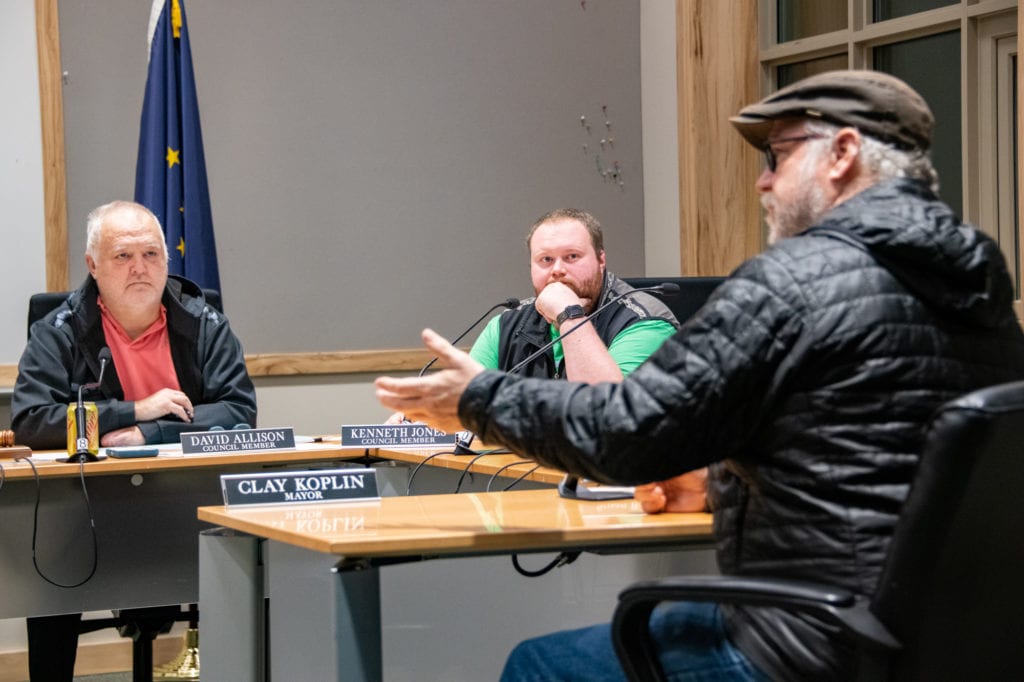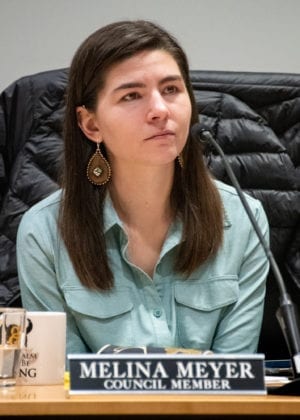
Cordova City Council voted Dec. 4 to pass a 6 percent surtax on alcohol, tobacco and marijuana products. The surtax is part of an effort to offset a $800,000 gap in funding caused mainly by state budget cuts.
Cordova should choose to raise revenue before cutting services, said Helen Howarth, Cordova’s newly appointed city manager. Without increasing revenue, the city would be forced to subject residents to burdensome cuts to services like education and healthcare, Howarth said.
Around $600,000 of the $800,000 funding gap is directly attributable to budget vetoes by Gov. Mike Dunleavy, Howarth said.
“We have been presented quite a can of worms with the cuts that Dunleavy initiated in July,” she said. “At this very moment, my goal is to find a way to operate this city in a financially sustainable way that provides the services that maintain the quality of life that we all enjoy here.
“It’s like a Rubik’s Cube. There is a way to make all the colors line up, to make everything work beautifully. We, as a city, are just struggling to figure out how… But, when everything lines up, it’s a beautiful thing to behold.”
Complicating the situation is the fact that the state runs according to a July–June fiscal year, whereas Cordova follows a January–December fiscal year. As a result, the state’s cuts took effect halfway through the city’s financial year.
As well as the new 6 percent surtax, city council is considering raising the general sales tax, currently set at 6 percent. The revised general sales tax could take the form either of a steady 7 percent tax or of a seasonal tax rising to 8 percent in the summer and falling to 5 percent in the winter. Either would produce practically the same net revenue, Howarth said.
Local businesses are suspicious that the proposed seasonal sales tax could, in the future, be raised to a steady 8-percent tax, said Mayor Clay Koplin. However, the most prevalent criticism of the seasonal tax is that switching back and forth between two tax rates each year would be excessively difficult, he said.
Howarth is additionally seeking areas where targeted cuts could improve efficiency. Indiscriminate cuts could hamper the city’s ability to function effectively, she said. For guidance on where to avoid cutting if possible, Howarth looked to the Cordova Comprehensive Plan, which was recently revised using extensive public polling. According to data cited in the plan, residents prioritize access to quality education and other services potentially impacted by budget cuts.

“It’s not just about paying a bunch of people to work in city hall,” Howarth said. “It’s about the school and the hospital. It’s to provide services across the community that are vital — the things that the community holds dear, that they said were core to their enjoyment of this community. Those are things that we’re really trying hard to maintain.”
Though city council agrees that dramatic change is necessary to balance the budget, support for the surtax on alcohol, tobacco and marijuana has not been unanimous. At a Dec. 4 meeting, Councilman Kenneth Jones, speaking as a private citizen, read “The Tax Poem,” an anonymous poem describing a citizen whose life is destroyed by excessive taxation. During the meeting, residents also commented on the surtax ordinance, showing no clear consensus for or against.
“No new taxes!” resident Robert Beedle said, addressing the council. “We’re still not going to tax ourselves into prosperity… It’s hard to grow a business. We’re showing we’re not open for business.”
Also opposed to the surtax was Councilwoman Melina Meyer, who plans to open a retail marijuana store in Cordova.
“You’re not going to hear a lot of people coming in, talking about this tax, because it has a lot of stigma against it, and maybe that’s one reason I went into this: because I don’t agree with the stigma attached to it,” Meyer told the council, having recused herself. “Attaching it to the same as alcohol and tobacco also is very incorrect.”
Meyer wants to move marijuana consumers away from illegal drug dealers and toward purchasing tested, regulated products, she said. Marijuana retailers are subjected to substantial taxes and fees, including a marijuana license costing $5,000 per year, four times more than the equivalent license for alcohol issued by the Alcohol & Marijuana Control Office. Pricing in these fees will make it harder to attract buyers away from cheap black-market marijuana, she said.
Taxes targeting alcohol and tobacco are traditionally justified as helping compensate for costs incurred by consumption of those substances. The Cordova Police Department spends around 40–50 percent of its time responding to situations involving drugs and alcohol, said Police and Fire Chief Mike Hicks.
“In general, those kinds of substances are known to have an impact on the community on some level, whether it’s starting fires or starting brawls in the bars and having police come out,” Howarth said. “There’s a natural tendency to put together… things that could impact the community. With pot, maybe it’s that people don’t get out of bed in the morning and get to work on time.”
Meyer urged the council to amend or to vote down the ordinance. Councilman Jeff Guard proposed putting a one-year moratorium on the tax in order to allow Meyer’s business to establish itself. However, the council rejected this amendment. The ordinance was passed by a vote of four-to-one, with Jones voting against and Meyer having recused herself.
During the meeting, council members mulled ways to reduce expenses without eliminating services, such as temporarily filling some staff positions with volunteers, or delaying replacing equipment until the end of the 2020 fiscal year. Howarth also suggested dipping into the city’s cash reserves as a stop-gap measure, hoping that it would be possible to replenish the reserves by the end of that year.
Residents can help make city council’s job easier by shopping at local businesses, Koplin said.
“Those Amazon dollars, those Anchorage dollars really do add up,” Koplin said. “They used to say that one dollar spent in Cordova circulated seven times before it left. That can’t possibly be the case now… If people choose to shop in Cordova, there are economies to be had.”
Howarth urged residents to participate in public events and to reflect that their tax dollars aren’t simply evaporating into the air, but are being used to strengthen and invigorate the community, she said.
“It may not help the budget, but it helps the dialogue,” Howarth said. “When you’re not sitting at home, grumbling about the fact that your property taxes just went up by $22, you can see what that money is doing for the community — how your dollar is helping.”
By trimming fat and raising revenue, Howarth hopes to finish 2020 with funds to spare. Expecting that the state’s next budget will include more cuts, it’s important to make sure that the city’s budget is balanced sustainably, she said.
“We all hope this is a short-term situation, but you never know,” Koplin said.





